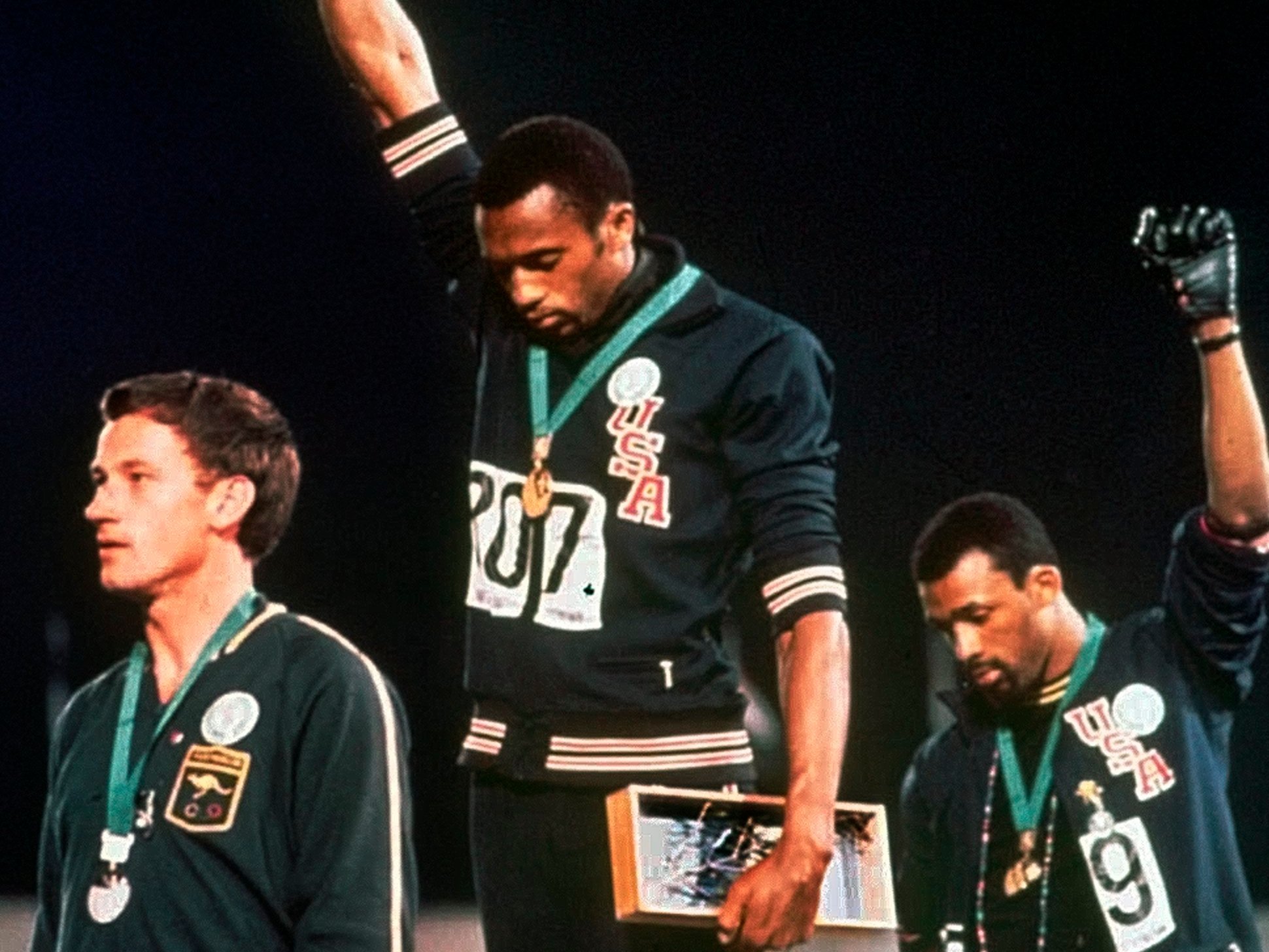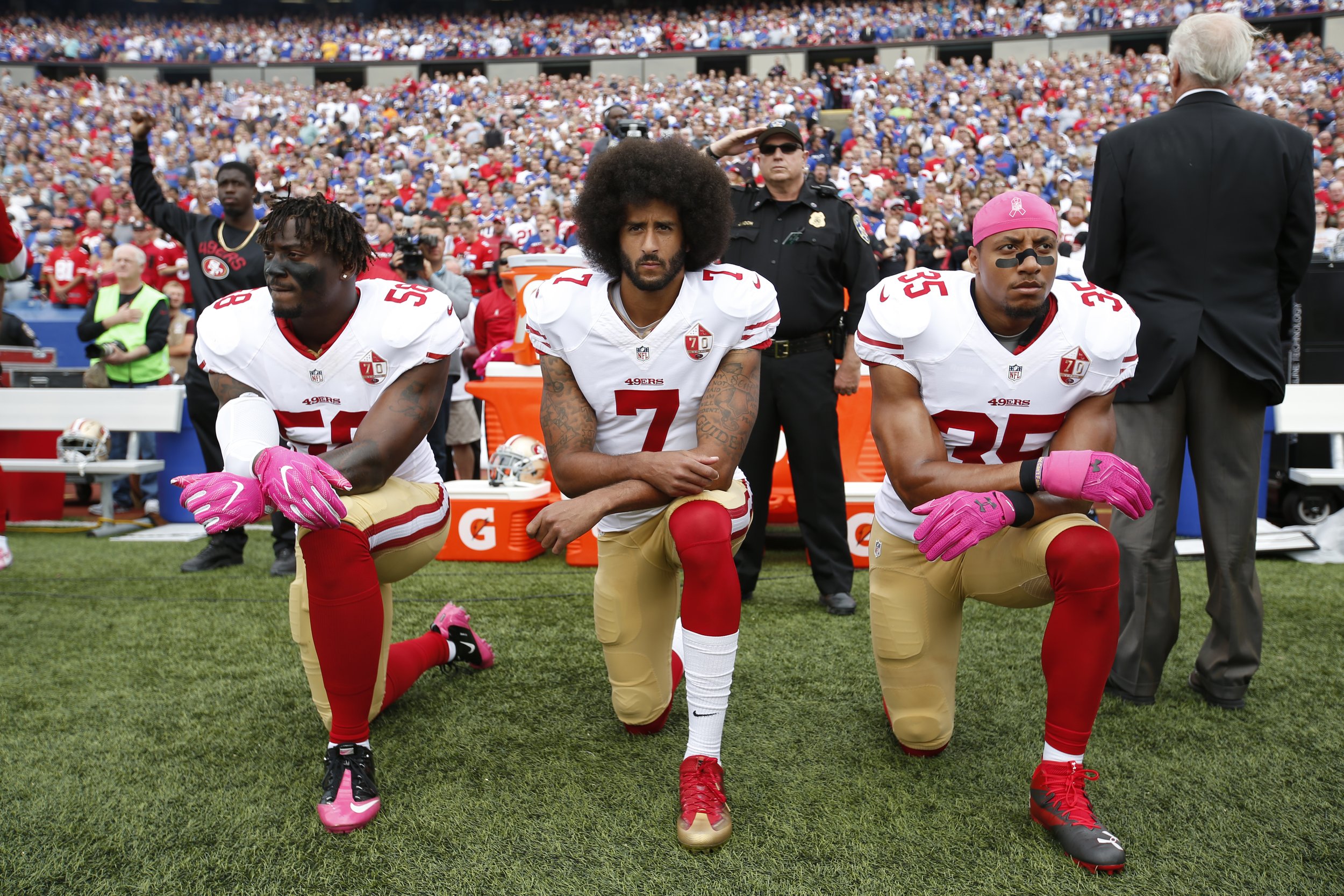Be thankful for athletic activism
Tommie Smith and John Carlos protesting at the 1968 Summer Olympics. (Photo courtesy of The Washington Post)
There is never a time and place to stand up for what one believes is morally just. This is because there is no better time than the present, a sentiment shared by numerous athletes over the years. Professional athletes have long suffered intellectual marginalization by socio-political pundits, as well as sports analysts, due to the physical nature of their profession. There is often the notion that athletes feed their bodies more than their minds, so it’s fitting on a gluttonous day like Thanksgiving to dispel this sweeping generalization.
The 1968 Summer Olympics in Mexico occurred during a period of extremely potent social discourse, particularly in relation to the civil rights of African-Americans. Two African-American track-and-field participants, Tommie Smith and John Carlos, placed first and third respectively. They received their medals and climbed the podium; “The Star-Spangled Banner” started playing and the duo turned to an American flag and raised their black-leather-covered fists out of solidarity for the American Civil Rights Movement. Australian silver-medalist Peter Norman did not participate in the gesture, but still sympathized with their intentions by donning a human-rights badge during the ceremony. Both Carlos and Smith were banned from the U.S. team and admonished for being political in a supposedly “apolitical” setting. This is ironic considering the presence of Nazi salutes during the 1936 Berlin Summer Olympics that blatantly prefaced the rise of Adolf Hitler’s regime. Many onlookers enjoyed the privilege of cherry-picking what acts of activism are deemed appropriate for their liking, while criticizing other causes for the sake of being contrarian or generally intolerant.
Colin Kaepernick kneeling with teammates. (Photo courtesy of TIME)
No athlete may feel stronger in this regard than Colin Kaepernick. Kaepernick carried the spirit of Smith and Carlos’ statement by choosing to sit during the same anthem that played before one of his games as the quarterback of the San Francisco 49ers. Kaepernick felt that he should not stand for a flag that represents a country that does not stand for him, but he altered his position by deciding to kneel out of respect for the U.S. military. Kaepernick inspired incredible masses of professional athletes to join him in protest of police brutality and racial inequality, both of which were further intensified by the murder of George Floyd. There was a long period during the 1990s and 2000s were African-American professional athletes were targeted for embracing their upbringing or culture, whether it was through David Stern’s NBA dress code that was incited by Allen Iverson’s personal style or the NFL continuously fining players who wore personalized cleats and accessories that clashed with their uniform colors.
Brandi Chastain’s winning penalty shootout goal to lift the U.S. to their second Women’s World Cup victory in 1999 exhibited a similar aesthetic form of activism. After converting the shot, Chastain celebrated by removing her kit and revealing her sports bra, a taboo sign of vulnerability that captured the objectification and sexualization of women athletes and icons throughout the history of pop culture. The same ways that male athletes have been demonized for their individualistic style was paralleled by Chastain’s sports bra, a statement that transcended its attachment to “fashion” by how wholly integral the article of clothing is to the stereotype of femininity. The 1999 World Cup debatably lifted Women’s soccer into an unprecedented amount of mainstream popularity which was embodied by the individual female empowerment of Chastain.
Still, many people find outlets to establish elitist superiority over athletes that they feel are not deserving of the spotlight. In 2018, LeBron James was antagonized by journalist Laura Ingraham for responding to numerous racial attacks around the country and towards him, such as a racial slur that was graffitied on his home. Ingraham told James to “shut up and dribble”, as well as claiming that James’ statements were “barely intelligible” and “ungrammatical”. Ingraham’s ignorance is overtly appalling and it’s hard to ignore the condescension of intelligence in relativity to the fact that James made his fortune without having to attend higher education or work a regular job, but through his athletic skill. James and Kaepernick may never have the academic accomplishments of those who critique their views, but they have an unparalleled platform that can be beneficially utilized in ways that people like Ingraham could only dream of; it’s likely why Ingraham resorts to the aforementioned rhetoric drenched in shock value for its radical stance.
The German national team protesting against Qatar’s regulations. (Photo courtesy of Marca)
The 2022 World Cup in Qatar is the most recent edition of athletic activism that has attempted to be silenced by higher powers. Qatar officials barred seven European national teams from allowing their captains to wear a “One Love” arm-band that expresses support for the LGTBQ+ community. Homosexuality is illegal in Qatar, which has led them to enforce their jurisdiction over the freedom of expression that is more common among many of the countries participating in the tournament. Not only did Qatar voice their opposition to the national teams’ activism, but they issued penalizing mandates that would deal captains a yellow-card, a punishment that can make it easier for such players to be ejected from future matches. As history tells us though, suppression can lead to alternative revolution. The German national team covered their mouth during the lead up to their debut showcase in the tourney to quite literally depict how Qatar is restricting the voices of people who do not even associate with the nation. Moreover, Belgian Foreign Minister Hadja Lahbib was seen sporting the arm-band when she met with the FIFA President, Gianni Infantino, during the country’s duel with Canada.
The 2022 World Cup has also seen the Iranian national team demonstrate their opposition to their own compromised government. Mahsa Amini was a 22-year-old Iranian woman who was arrested for wearing her hijab incorrectly, and was subsequently allegedly killed by Iranian authorities after being badly beaten. Protests followed and the country’s paranoia about securing public theoretical submission has been fully exposed after 416 protestors have been killed simply for their involvement in the dissent. The Iranian national team chose not to sing their country’s anthem in coalition with a similarly disgruntled crowd that booed the tune. Regardless of how politically aware or intellectually stimulated the Iranian soccer players are, the authenticity of their activism is undeniable when it’s broadcasted on arguably the largest stage possible. No reasoning or proof of dedication is needed from the players, as the purpose is to draw attention to the situation so that those who can intervene or properly analyze it will do so.
The long history of athletic activism is one that will never end, and should never end. Of course there are instances where players misuse their reach to promote damaging and uninformed perspectives. This can provide pundits with the opportunity to use such examples as scapegoats for issues that extend beyond them, ultimately belittling the scope of a conflict down to someone who should not represent it. The cases I mentioned before are the other end of the spectrum though, aspects of athletic activism that should be appreciated in all their uncompromising glory.



